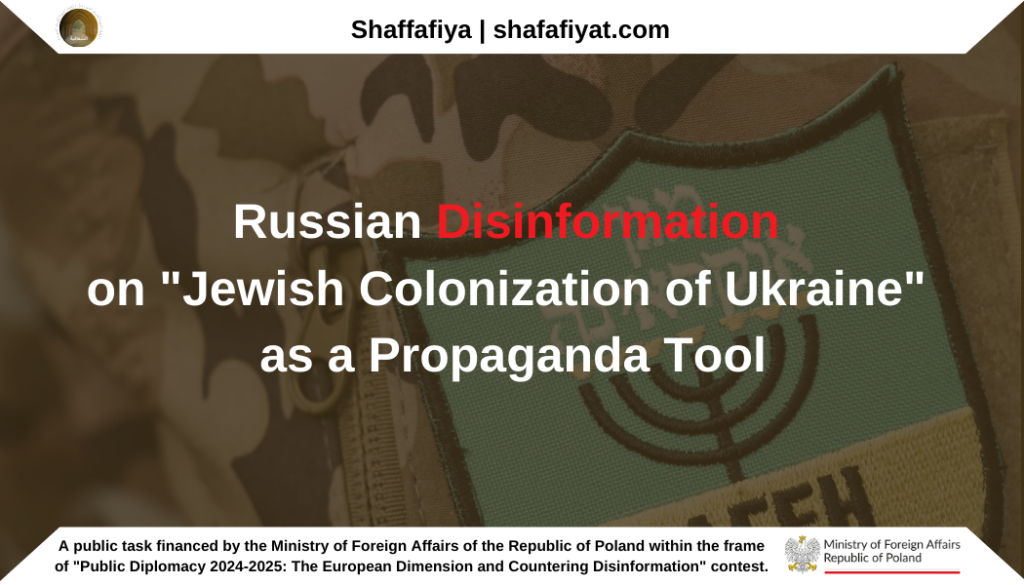
The Russian Federation employs complex disinformation techniques to influence public opinion, particularly in Middle Eastern and North African (MENA) countries. One example of such disinformation is the manipulation of images showing Jews traveling to Uman, Ukraine, where annual Rosh Hashanah (Jewish New Year) celebrations are held. Images of the Hasidic pilgrimage have been used by pro-Russian propaganda centers to fabricate a narrative about an alleged “mass immigration of Jews through Poland to Ukraine” and the construction of a “new Ukraine” as a “Jewish state” under the protection of President Volodymyr Zelensky.
Kremlin Hypocrisy: “Nazi” Ukraine and “Jewish Colonization”
Russia’s use of anti-Semitism as a propaganda tool has a long history, as detailed in the article “Anti-Semitism in Russia” (https://infoops.pl/antysemityzm-w-rosji/) and confirmed in this year’s U.S. State Department report (https://www.state.gov/wp-content/uploads/2024/01/GEC-Special-Report-More-than-a-Century-of-Antisemitism.pdf). On one hand, the Kremlin and pro-Russian media consistently portray Ukraine as a state supposedly overrun by Nazis, anti-Semites, and Russophobes, invoking emotionally charged rhetoric about “denazification” of Ukraine as a goal of the Russian invasion. In this narrative, Zelensky – who is of Jewish descent – is hypocritically depicted as a leader supporting anti-Semitic groups. On the other hand, Russian propaganda employs a completely different tactic by portraying Zelensky as a Jew who allegedly opens Ukraine to mass Jewish immigration, suggesting that they are “colonizing” the country to establish a new Jewish state. This version of disinformation finds particular use in Arab countries, where anti-Semitism is sometimes rooted in certain segments of society. Pro-Russian channels and social media, often with fake accounts or bots, spread images of Uman pilgrims as “evidence” of this false narrative.
Objective of Disinformation
This kind of dual disinformation strategy aims to:
- Heighten anti-Semitic and anti-Ukrainian sentiment – It seeks to instill suspicion toward Ukraine in MENA countries, discouraging them from providing diplomatic and material support for Ukraine.
- Defame the opposition – Russian propaganda not only manipulates public opinion abroad but also strives to silence internal opposition. An analysis by the Israeli think tank associated with Bar-Ilan University, Begin-Sadat Center for Strategic Studies, titled “The Russian-Speaking Jewish Diaspora and the War in Ukraine,” notes that in Russia, Ukraine, and Belarus – collectively home to around 90% of Jews living in former Soviet states – authorities in these three countries demanded unequivocal support for their policies in the face of the war in Ukraine. This support was expected not only from Jews as individual citizens but also from Jewish organizations in these countries (https://besacenter.org/the-russian-speaking-jewish-diaspora-and-the-war-in-ukraine/). Jewish responses to these expectations varied. While Ukrainian Jews, both personally and organizationally, are nearly unanimous in their support for their country’s leadership in its war and humanitarian efforts, not all Jews in Russia and Belarus have the courage to oppose the official narrative, according to the report’s authors. Therefore, it can be inferred that the Kremlin’s propagandistic actions described in both cited analyses, such as spreading anti-Semitic stereotypes and conspiracy theories, may create an atmosphere of fear and uncertainty among Russian Jews, which may be perceived as a form of intimidation.
Additionally, the intensification of repression against the opposition and civil society in Russia following the invasion of Ukraine, as noted in the BESA Center analysis, may also impact the sense of security among Russian Jews, even if they are not directly targeted by these actions.
- Strengthening conspiracy theories – Russia exploits existing conspiracy theories about Jewish “control of the world” and adapts them to current events to reinforce its messaging. Similar narratives were used during the tsarist and Soviet eras, such as the “Protocols of the Elders of Zion” – a fabricated document that served to justify anti-Semitism and fear of a Jewish “conspiracy.”
Impact on MENA Communities
Pro-Russian messages in the MENA region are intentionally manipulated to exploit existing hostilities and prejudices. In Arab countries, disinformation about “Jewish colonization of Ukraine” may find fertile ground and strengthen anti-Western and anti-Israeli sentiments. This disinformation serves to inflame emotions and divisions, which Russia can exploit to weaken international solidarity with Ukraine.
Summary
The Kremlin’s propaganda surrounding the alleged “Jewish colonization of Ukraine” exemplifies an advanced disinformation strategy that uses anti-Semitism, lies, and manipulation to achieve political goals. This approach seeks both to undermine the credibility of Ukraine and Zelensky and to silence internal opposition to the war. By using double standards and manipulating historical biases, the Kremlin aims to create confusion and destabilization on the international stage, diverting attention from its own aggressive actions.
Author: Wojciech Pokora – INFO OPS Poland Foundation

